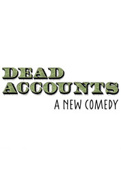Theresa Rebeck on America's Changing Values and the Midwestern Heart of Her New Comedy Dead Accounts
About the author:
In the past decade, Theresa Rebeck has emerged as one of America's most prolific and successful playwrights, shifting with ease from thrillers (The Water's Edge; Mauritius) to comedies set in the worlds of theater (The Understudy) and literature (Seminar). She also found time to write a novel (Three Girls and Their Brother) and create NBC’s buzzy Broadway drama, Smash. Actors love delivering Rebeck's juicy dialogue, which explains why her new comedy, Dead Accounts (opening on November 29 at Broadway's Music Box Theatre), has attracted a top-notch cast led by Katie Holmes and Norbert Leo Butz. Set in the swing state of Ohio, the play chronicles a man’s mysterious return home with oodles of cash in tow. In an exclusive essay for Broadway.com, Rebeck shares her thoughts on the differences between Midwesterners and New Yorkers (a central topic of the play) and why, in an election year, America’s values are more important than ever.
![]()
America doesn’t know how to talk to itself anymore.
It wasn’t always like this. I was born and raised in the Midwest, where people were taught that decency and integrity and community were all important values. We were democrats with a little "d." We were told that hard work and talent and character would get you somewhere. At school, we learned it was important to share. On Arbor Day, we all planted trees.
And we admired the people who lived and worked on the East Coast. Writers like Arthur Miller and Tennessee Williams were heroic figures. The great museums and orchestras and universities were, to us, the jewels of American accomplishment. It was an unimaginable thrill to go to New York and see the Statue of Liberty and the Empire State Building and Times Square. To see a play on Broadway—which cost, I think, about $25—was a dream beyond dreaming.
I don’t know what New Yorkers thought about Midwesterners during those years—and this wasn’t all that long ago; I’m actually not a hundred years old. I do know what New Yorkers think of the Midwest now, and I know what the Midwest thinks of New York. When I go to Ohio to visit relatives on holidays, I am often astonished by the level of casual dismissal offered up by way of discussion. At a time when the country faces deeply complex challenges around its future and the future of the planet itself, there is a sense that only crazy East Coast liberals worry about that stuff.
There is a sense that the East Coast has lost its moral center. The catastrophe of the banking industry, and the scandalous waste of our character, perpetrated by our government and the media has offended the Midwest so deeply they don’t want to even talk about it. Or, they do want to talk about it, but they are so angry and simultaneously so polite, they don’t know how to talk about it. So they bury their heads in Fox News and pretend that reducing the deficit will salve their anxiety.
Meanwhile, the East Coast cannot believe how stupid the center of the country seems to have gotten.
How do you make this funny? There are times when I wonder how I ever thought that I could dramatize the death of a national discussion as a family comedy. But so many of us are the spawn of this perplexing divide; we carry it in our DNA. The question—How did we start there, and get here?—is in fact a question of mortality. Which, as we all know, is hilarious.
Death is coming to our little family, and so we fight to live. Peculiarly, that is funny. And we do have things to teach each other. As long as we can remember how to talk.
